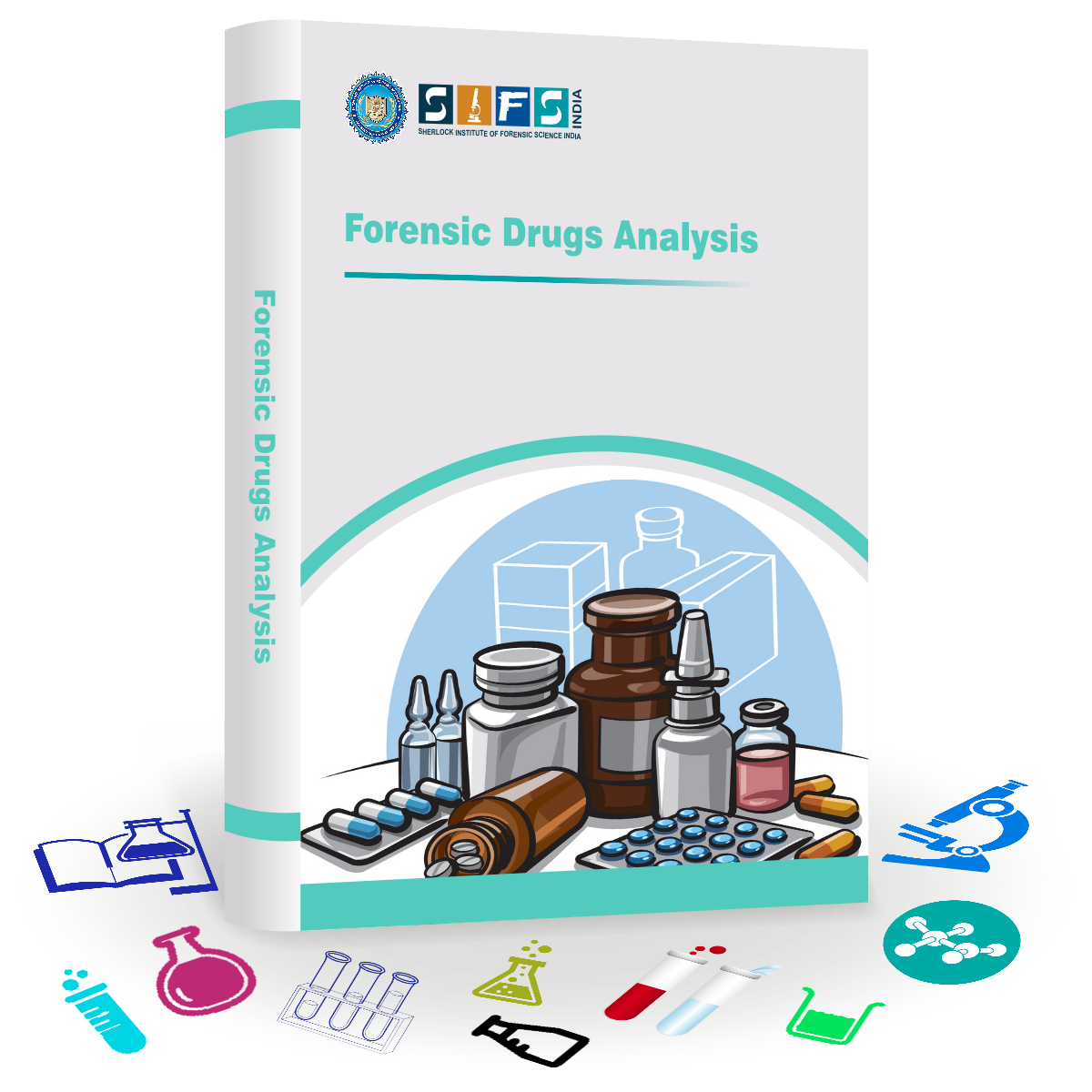MODULE 1 - DRUG ADDICTION
The module starts with a comprehensive exploration of drug addiction, its historical context, and its legal definition. It then proceeds to highlight the causes of drug addiction, the concept of a drug addict, and outlines methods for identification, including both the signs and symptoms of addiction and the challenging withdrawal symptoms. You will also learn about drug peddlers, the external factors contributing to drug-related issues, and the forensic aspects of drug addiction, emphasizing its relevance in legal and investigative contexts.
MODULE 2 - DRUGS AND CRIMES
In this module, you will learn about the historical aspects of drug-induced crime and the relationship between drug use and criminal activities, categorizing them into non-violent and violent crimes. The module further sheds light on the specific problems associated with certain drugs, highlighting the issues linked to cannabis, poppy, and cocaine. This module will equip you with a comprehensive understanding of the historical, criminological, and societal dimensions of drug-related crimes and the challenges posed by various substances.
MODULE 3 - CLASSIFICATION OF DRUGS
This module introduces you to the forensic aspects of drug-related issues, including identification, analysis, and the legal implications associated with each drug. It begins with drug classification, including narcotics, depressants (further categorized into sedatives and hypnotics), stimulants, hallucinogens, designer drugs, date rape drugs, and other miscellaneous drugs. Each category represents a different class of psychoactive substances and helps you understand the diverse pharmacological effects these drugs can have on individuals.
MODULE 4 - NARCOTICS
This module covers an in-depth study of narcotics, starting with opium and its derivatives, including morphine, heroin, codeine, and thebaine. Each substance is thoroughly examined, covering aspects such as origin, mode of administration, fatal dose and period, metabolism, physiological and psychological effects, addiction and withdrawal symptoms, as well as methods for collection, preservation, examination, and antidotes. This module will help you gain knowledge about the forensic intricacies of these narcotics, including their characteristics and effects.
MODULE 5 - DEPRESSANTS
In this module, you will learn about sedatives, specifically focusing on barbiturates and benzodiazepines, as well as hypnotics like phenothiazines. For each category, the content dives into essential aspects such as origin, mode of administration, fatal dose and period, metabolism, physiological and psychological effects, addiction and withdrawal symptoms, as well as methods for collection, preservation, examination, and available antidotes. The historical context is also discussed to help you gain a deep understanding of the development, classification, and forensic implications of these substances.
MODULE 6 - STIMULANTS
This module covers a comprehensive examination of various substances, starting with an introduction and historical context, followed by detailed insights into specific drugs. Various stimulants like cocaine, benzedrine, amphetamines, methamphetamines, and nicotine are explored, including their abuse as narcotics, mode of administration, fatal dose and period, metabolism, physiological and psychological effects, addiction and withdrawal symptoms, as well as methods for collection, preservation, examination, and available antidotes.
MODULE 7 - HALLUCINOGENS
This module explores an in-depth exploration of various hallucinogens and their historical overview. The focus will be on Cannabis, Lysergic Acid Diethyl Amide (LSD), Mescaline, Phencyclidine (PCP), and Peyote, including their origin, mode of administration, fatal dose and period, metabolism, physiological and psychological effects, addiction and withdrawal symptoms, as well as methods for collection, preservation, examination, and available antidotes.
MODULE 8 - DESIGNER DRUGS AND DATE RAPE DRUGS
In this module, you will learn about various aspects and a historical overview of designer and date rape drugs. The module covers drugs like Ketamine, 3, 4-Methylenedioxymethamphetamine (MDMA), 3, 4-Methylenedioxyamphetamine (MDA), Gamma-hydroxybutyric Acid, and Rohypnol, including details about their origin, mode of administration, fatal dose and period, metabolism, physiological and psychological effects, addiction and withdrawal symptoms, as well as procedures for collection, preservation, examination, and available antidotes. Along with these, a basic understanding of various designer drugs, including fentanyl, etorphine, buprenorphine, and mandrax, is also covered.
MODULE 9 - STEROIDS
This module focuses on the historical overview of steroids and the classification of steroids, focusing on their anabolic (synthetic or man-made steroids similar to male sex hormone testosterone and help in quick recovery from stress or fatigue due to exercise) and catabolic (type of drug to break down muscle mass and treat autoimmune diseases) distinctions.
MODULE 10 - ALCOHOL ILLICIT LIQUOR ABUSE
This module begins with an introduction and historical overview of alcohol and its various types, like country-made liquor, Indian-made foreign liquor, and foreign liquor. The manufacturing process, including fermentation and distillation, is discussed, along with topics like proof spirit, classification based on alcoholic content percentage, and the properties of liquor.
You will also learn about the pharmacological action of liquor on the body, covering absorption, distribution, metabolism, and elimination. The module also addresses signs and symptoms of alcohol consumption, including euphoria, muscular incoordination, and respiratory paralysis. Furthermore, you will gain insights about the critical aspects of fatal dose, fatal period, and the legal aspects related to alcohol.
MODULE 11 - REPORTS ADMISSIBILITY
This module introduces you to the concept of a bona fide expert and explores liquor identification methods, the challenges posed by prohibited liquor, and the significance of proper collection procedures. You will also learn about the admissibility of reports in legal proceedings and the concept of intoxication, both as a forensic consideration and a potential defence strategy. The module concludes with the importance of random and correct sampling techniques in forensic investigations, along with an overview of several key elements in the forensic analysis of liquor-related cases.
MODULE 12 - THE NARCOTICS DRUGS AND PSYCHOTRPOIC SUBSTANCES ACT, 1985 (NDPS ACT)
This module focuses on the legal framework and authority structure related to narcotics and covers the power of officers, emphasizing delegation and the authority of the Narcotic Commissioner and their subordinates. The difference between officers of the state government and those of the central government is discussed, which provides clarity about the responsibilities assigned to various officers within the narcotics legal framework.
MODULE 13 - NATIONAL FUND FOR CONTROL OF DRUG ABUSE
In this module, you will be introduced to the role of national funding in controlling drug abuse, an examination of the annual report of activities financed under the fund, the powers of the Central Government, highlighting its authority to prohibit, control, and regulate controlled substances, and the restrictive measures over external dealings involving narcotic drugs and psychotropic substances.
MODULE 14 - OFFENCES AND PENALTIES
This module outlines the legal consequences for contraventions related to poppy straw, coca plants, coca leaves, prepared opium, opium poppy, opium, manufactured drugs, cannabis, and psychotropic substances. You will also learn about the penalties for illegal import into India, export from India, and transshipment of narcotic drugs and psychotropic substances externally.
MODULE 15 - FORFEITURE OF PROPERTY DERIVED FROM, OR USED IN ILLICIT TRAFFIC
This module covers the legal provisions related to the use of illegally acquired property, its prohibition, and the procedural aspects concerning certain trust properties. You will also learn about the property release process for specific cases and the application procedures.








